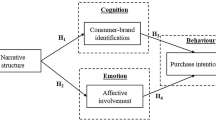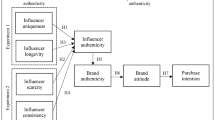Abstract
This article develops a conceptual foundation for Conscientious Corporate Brands (CCBs) by exploring the role that (i) environmental and (ii) climate change issues, and that (iii) internal and (iv) external corporate codes of ethics play as dimensions of CCBs. The article's aim is to extend previous research in ethical branding by proposing an empirically grounded conceptual foundation of ‘the conscientious dimension’ of a corporate brand. The empirical context is based on Nordic business-to-business relationships.


Similar content being viewed by others
References
Abela, A. (2003) Additive versus inclusive approaches to measuring brand equity: Practical and ethical implications. Journal of Brand Management 10: 342.
Abela, A.V. and Murphy, P.E. (2008) Marketing with integrity: Ethics and the service-dominant logic for marketing. Journal of the Academy of Marketing Science 36: 39–53.
Borgerson, J.L., Schroeder, J.E., Escudero Magnusson, M. and Magnusson, F. (2009) Corporate communication, ethics, and operational identity: A case study of Benetton. Business Ethics: A European Review 18: 209–223.
Bruntland, G.H. (1987) Our Common Future/World Commission on Environment and Development. Oxford: Oxford University Press.
Byrne, P.M. (2007) Sustainability and the supply chain. Logistics Management, November: 21–22.
Campbell, D. (1955) The informant in quantitative research. American Journal of Sociology 60 (4): 339–342.
Carroll, A.B. (1991) The pyramid of corporate social responsibility: Toward the moral management of organizational stakeholders. Business Horizons 34: 39–48.
Carson, R. (1962) Silent Spring. Boston, MA: Houghton Mifflin.
Carter, R.C. and Rogers, D.S. (2008) A framework of sustainable supply chain management: Moving toward new theory. International Journal of Physical Distribution & Logistics Management 38: 360–387.
Ciliberti, F., De Goot, G., De Haan, J. and Pontrandolfo, P. (2009) Codes to coordinate supply chains: SMEs’ experiences with SA800. Supply Chain Management: An International Journal 14: 117–127.
Crane, A. (2001) Unpacking the ethical product. Journal of Business Ethics 30: 361–373.
Fan, Y. (2005) Ethical branding and corporate reputation. Corporate Communications: An International Journal 10: 341–350.
Ford, D. (2001) The development of buyer-seller relationships in industrial markets. European Journal of Marketing 14: 339–352.
Golicic, S.L., Boerstler, C.N. and Ellram, L.M. (2010) Greening’ transportation in the supply chain. MIT Sloan Management Review 51: 47–55.
Hagelarr, G.J.L.F., Van Der Vorst, J.G.A.L. and Marcelis, W.J. (2004) Organizing life cycles in supply chains – Linking environmental performance to managerial designs. Greener Management International 45: 27–42.
Hair, J.F., Black, W.C., Babin, B.J., Anderson, R.E. and Tatham, R.L. (2006) Multivariate Data Analysis. NJ: Prentice Hall.
Håkansson, H. and Snehota, I. (1995) The burden of relationships or who's next. 11th IMP Conference. Manchester.
Hall, J. (2007) The ethical opportunity. Journal of Brand Management 14 (5): 368–379.
Hatch, M.J. and Schultz, M. (2001) Are the strategic stars aligned for your corporate brand. Harvard Business Review 79 (2): 128–134.
Hofstede, G. (1983) National cultures in four dimensions. International Studies of Management and Organization 13: 46–74.
Hopkins, M.S. (2009) 8 reasons sustainability will change management (that you never thought of). MIT Sloan Management Review 51: 27–30.
Jöreskog, K.G. and Sörbom, D. (1976) LISREL III: Estimation of Linear Structural Equations Systems by Maximum Likelihood Methods. Chicago, IL: National Educational Resources, Inc.
Mahler, D. (2007) The sustainable supply chain. Supply Chain Management Review, November: 59–60.
Markely, M.J. and Davis, L. (2007) Exploring future competitive advantage through sustainable supply chains. International Journal of Physical and Distribution Management 37: 763–774.
Mulani, N. (2009) Sustainability: Your role as a supply chain leader. Logistics Management May: 23.
Murphy, P.E., Lacniak, G.R. and Wood, G. (2007) An ethical basis for relationship marketing: A virtue ethics perspective. European Journal of Marketing 41: 37–57.
Report, I.W.F.A. (2007) Climate Change 2007: The physical science basis – Summary for policymakers. Intergovernmental Panel on Climate Change.
Rindell, A. and Strandvik, T. (2010) Corporate brand evolution – Corporate brand images evolving in consumers’ everyday life. European Business Review 22: 276–286.
Rubin, J., Schultz, M. and Hatch, M.J. (2008) Coming to America: Can Nordic brand values engage American stakeholders? Journal of Brand Management 16: 30–39.
Scheuing, E.E (1996) Sourcing services. In: B. Edvardsson and S. Modell (eds.) Service Management. Göteborg, Sweden: Nerenius&Santerus förlag.
Sims, R.R. and Brinkmann, J. (2003) Enron ethics (or: Culture matters more than codes). Journal of Business Ethics 45: 243–256.
Stern, N. (2007) The Economics of Climate Change: The Stern Review. Cambridge: Cambridge University Press.
Svensson, G. (2008) Anti-Climate Change Management (ACCM) – ‘business-as-usual’ or ‘out-of-the-box’? Management Decision 46: 92–105.
Svensson, G. and Wagner, B. (2011a) Implementation of a sustainable business cycle: The case of a Swedish dairy producer. Supply Chain Management: An International Journal (forthcoming issue).
Svensson, G. and Wagner, B. (2011b) A process directed towards sustainable business operations and a model for improving the GWP-footprint (CO2e) on earth. Management of Environmental Quality (forthcoming issue).
Svensson, G., Wood, G. and Callaghan, M. (2009a) A Construct of the ‘Ethos of Codes of Ethics’ (ECE): The Case of Private and Public Sweden. International Journal of Public Sector Management 22: 499–515.
Svensson, G., Wood, G., Singh, J. and Callaghan, M. (2009b) A Cross-Cultural Construct of the Ethos of Corporate Codes of Ethics (ECCE): Australia, Canada and Sweden. Business Ethics: A European Review 18: 253–267.
Szmigin, I., Carrigan, M. and O'Loughlin, D. (2007) Integrating ethical brands into our lives. Journal of Brand Management 14: 396–409.
Trudel, R. and Cotte, J. (2009) Does it pay to be good? MITSloan Management Review 50: 61–68.
Turner, M. (2009) Going green? start with sourcing. Supply Chain Management Review March: 13, 3, 14.
Werther Jr, W.B. and Chandler, D. (2005) Strategic corporate social responsibility as global brand insurance. Business Horizons 48: 317–324.
Willmott, M. (2003) Citizen brands: Corporate citizenship, trust and branding. Journal of Brand Management 10: 362.
Author information
Authors and Affiliations
Corresponding author
Rights and permissions
About this article
Cite this article
Rindell, A., Svensson, G., Mysen, T. et al. Towards a conceptual foundation of ‘Conscientious Corporate Brands’. J Brand Manag 18, 709–719 (2011). https://doi.org/10.1057/bm.2011.38
Received:
Revised:
Published:
Issue Date:
DOI: https://doi.org/10.1057/bm.2011.38




